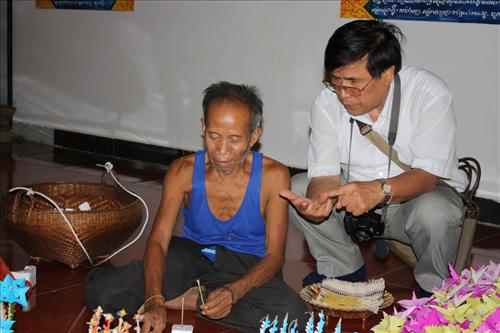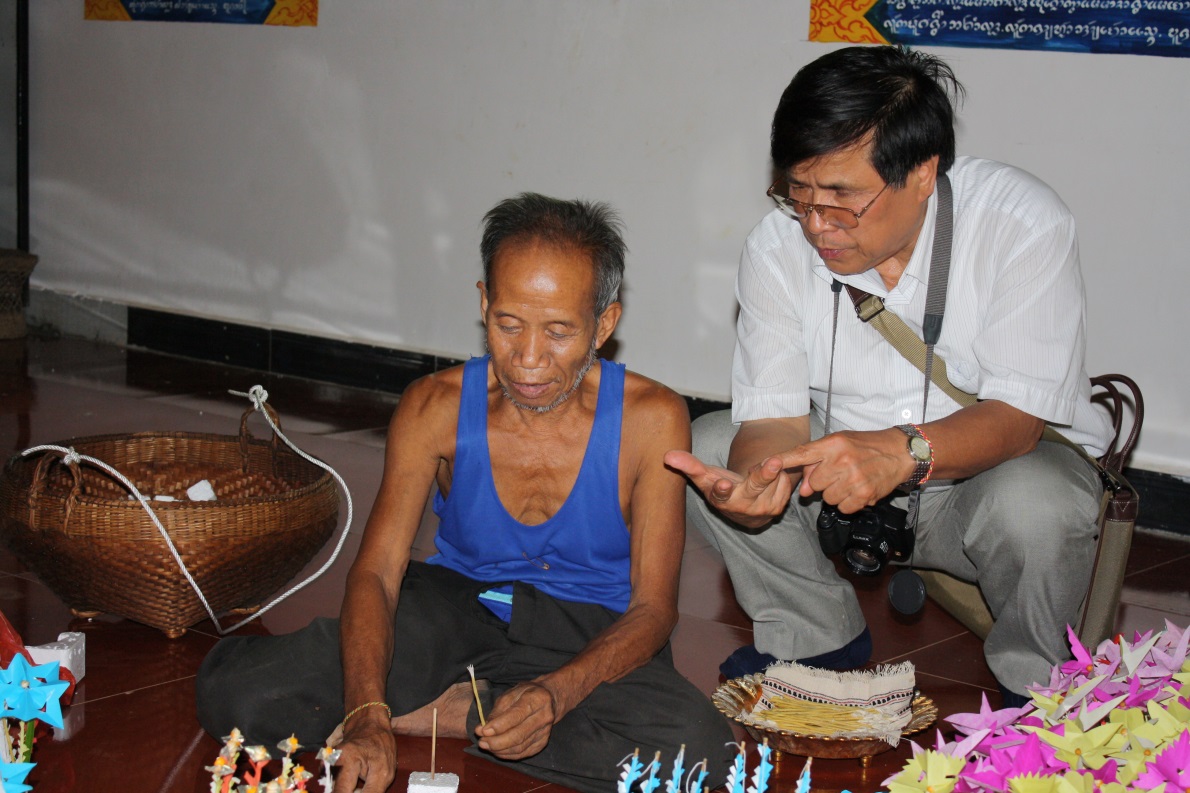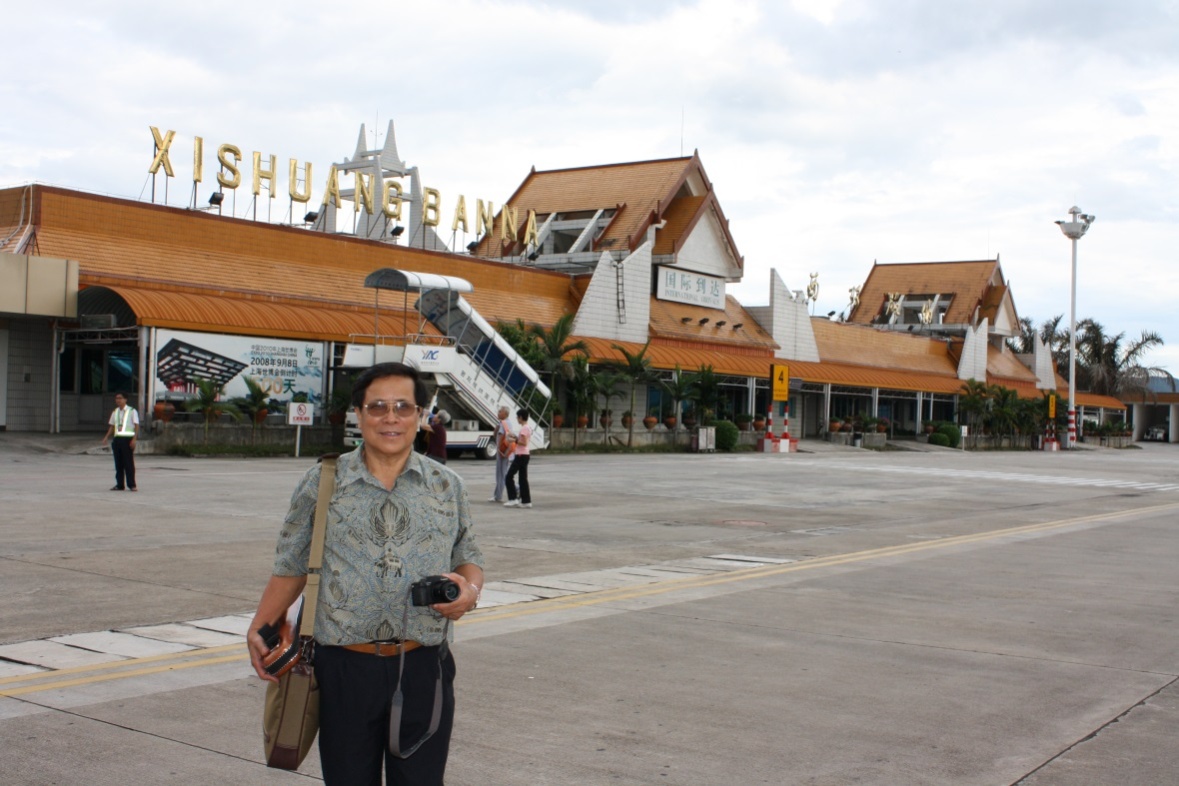
I started working at the Department of Ethnology a few years after Hoang Luong (he graduated in 1976, class 16, Faculty of History, Hanoi University), but in terms of age, I am exactly one zodiac sign younger than him. He was born on December 7, 1944, the year of the Monkey, and his destiny wasstreamHis life of more than 70 years is just like the fate he was born with, a "stream”. His name is also very special. Hoang Luong, in Chinese characters, means “golden chicken”. This name is associated with a literary allusion from the Tang Dynasty, talking about “dream of the yellow grain" with profound implications about the meaning of life.

I still remember the first impressions when I met him. He was a simple, honest, approachable, and quite open person. His world in the first years of working at the History Department was a small corner in the dormitory room. What impressed me most in that limited living space was a bookshelf that was always full of romantic novels that were very fashionable at that time, such asThe Gadfly, Vanity Fair, The Godfather, One Hundred Years of Solitude, The Thorn Birds,vv He did ethnological research but he probably also loved literature. He considered himself a romantic person. He liked to play the flute and sing love songs. I remember when I visited Sa Pa in the mid-1990s, at midnight he still wandered the streets, stood in the middle of the steep road next to the Fansipan Hotel, which was left from the colonial period, and sang the songNorthwest Love Song, so absorbed that I almost forgot the way home. Knowing that he loved beauty, when I went to the Netherlands for work, I sent him a postcard with tulips simulating the silhouette of a girl. He kept this postcard for many years on the bookshelf, and every time friends came to visit, he took it out to show off as an elegant hobby. But he was also a very practical person, and a very good cook. He always knew how to save every grain of rice in his small ration during the subsidy period so that at the end of the month he wouldn't have to rush to borrow rice or eat for free like us kids. While the entire fortune of most of the teaching staff at that time was just a few sets of clothes and a small bed with a thin mat, his bed was always full of the Thai blanket-pillow-mattress trio. He said that these things were brought down from the countryside, made by his wife, and he used them as a way to always feel his wife's love and the taste of his homeland.
I became closer to him after returning from the army to the Department of Ethnology. As was a habit at that time, the single men of the History Department often gathered at his place to gossip, and no matter which direction the stories took, they always returned to the topic of love, women, and different views on the value of life. Sometimes, during those leisurely drinks, small debates still happened, and he often ignored other opinions to defend his unique point of view. While social life in the 80s was full of jostling, hustle, and competition, he still seemed to be indifferent to worldly affairs, did not like to fight for any advantage for himself, and was often satisfied with what he had. He often helped people by lending his war invalid card to buy subsidized goods. Sometimes he personally rode his bike to queue up to buy for this person or that person, even if it was just a few pounds of meat, a kilo of fish, or some tofu. There were also people who did not like his simple, honest and rustic personality, but he ignored it all. Being a Thai ethnic and a war invalid, he could have used those advantages to get himself a foreign research scholarship like most young cadres at Hanoi University at that time often wished for to find a way to advance, but he did not run around and jostle to get that. Some people said he was foolish, he laughed, saying that in life he did not know what was foolish or wise. Perhaps all his life, he had waited for some kind of fairness and believed that it really existed in the world. In debates, he was very enthusiastic and open, but often chose to accept concessions instead of fighting for the better part for himself. When he was about to retire, he was awarded the title of excellent teacher, he happily thought that this was also a recognition from the state for his contribution to the cause of educating people.
In the history of the Department of Ethnology in the past and Anthropology today, Hoang Luong has an important position in management, training and development. As the head of the department for two terms, he did not manage by "tricks" as he often compared, but by sincerity and enthusiasm. Many generations of students who have studied Ethnology with him all share the same feeling that he teaches with a burning love for the profession, and has passed that passion on to his students. Many students confessed that they came to ethnology thanks to attending lectures by Mr. Hoang Luong. This is very different from some lecturers who consider themselves experienced in teaching while still only using old notes from decades ago as lectures, and every time they go to class, they calmly sit and read them for students to copy, making students feel discouraged with this subject. During his teaching career, Hoang Luong tried to find talented students and encouraged them to pursue a scientific career, so that today we have promising anthropologists such as Truong Huyen Chi and Nguyen Thi Thu Huong. Both of them received their doctorates from famous universities in Europe and North America, but deep in their hearts, they will never forget the first teacher who instilled in them a love for the profession, Hoang Luong. Perhaps there will still be different opinions debating Hoang Luong's teaching methods at university. Some people believe that each lecture must be prepared according to a certain unit of knowledge and when the teacher goes to class, he or she will just convey it to the students. But Hoang Luong rarely follows that rigid model. He still believes and persists in his own way, that a teacher in class does not need to demonstrate his academic erudition, but can, by raising scientific suggestions, create passion in students for the issues raised so that they can discover new horizons of knowledge on their own. Even after retirement, he still teaches, not to earn a few pennies, but to satisfy his passion for connecting with his students and passing on to them his love for the profession. I have no doubt that he was a teacher who loved his profession until his last breath.

Associate Professor Dr. Hoang Luong on his way to explore Sipsong Banna (Yunnan, China, August 2009). Photo: Nguyen Van Chinh.
The history of Vietnamese anthropology also needs to recognize the contribution of Associate Professor Hoang Luong as one of the pioneers who paved the way for the transition from ethnographic to anthropological approaches. In the early 1990s, in the movement of academic innovation, Hoang Luong himself, as the head of the department, embarked on a project to innovate ethnography by introducing an anthropological approach into research and teaching in the ethnography department of the Faculty of History. However, his opinion was met with fierce opposition, and there were even many people who were sarcastic and underestimated his efforts. Some people even laughed at him, saying that he was doing an unrealistic job, demanding innovation in a subject that he did not have a firm grasp of. There were also opinions that doubted whether there was a scientific discipline called cultural and social anthropology in the world. Although Hoang Luong was pushed into a state of confusion after his proposal was flatly rejected by the Scientific Council, he was not discouraged. Consulting with colleagues, he wrote to several famous anthropology professors at major universities around the world to ask for their help in solving problems related to anthropology. One of them, Professor Luong Van Hy at the University of Toronto (Canada), responded with sincere suggestions, making Hoang Luong more confident to persistently persuade his colleagues to support his proposal. Now, more than two decades have passed since Hoang Luong proposed to reform ethnology in the Faculty of History towards anthropological research, we see that most of the major universities in Vietnam have an anthropology department, and this major has been officially coded in the training program at all three levels from undergraduate to postgraduate. I believe that now Hoang Luong can smile in his grave because before returning to the eternal world, he saw generations of bachelors, masters and doctors in anthropology graduating from the major that he pioneered.
As a researcher, he has published many scientific articles, textbooks and monographs (Thai pattern(1988),Traditional festivals and folk beliefs of ethnic groups(2002),Customary law and the preservation and promotion of traditional cultural heritage of ethnic groups in the Northwest(2004),Culture of ethnic groups in the Northwest region of Vietnam(2005), etc., but Hoang Luong still only considers himself a “fake” scientist. According to him, the training program at the Faculty of History only teaches a few ethnological topics in the first semester of the fourth year, after which students do internships to write their graduation theses. He said that this is a system that trains half-baked ethnologists. However, he belongs to the type of person who does science in a committed way. Since he was a fourth-year student majoring in ethnology, he chose to study the La Chi people to write his graduation thesis. This is an ethnic group with a small population, living isolated in the highlands of Ha Giang province. In the 1970s, the population of this group was less than 10,000 people, mainly living in remote villages in the two highland districts of Xin Man and Hoang Xu Phi. Only those with a scientific romantic spirit and a sense of adventure would accept to go here to do research. Later, he told that the small, poor, remote villages he visited had many people suffering from leprosy. But he did not leave them until he had collected documents to return to school to write his graduation thesis. In his field memories, in the rocky mountains of Ha Giang, there was no concept of suffering, only vast forests of lilies that made him stunned and unable to move. His university graduation thesis that year was excellent. The information he collected helped ethnolinguists a lot in classifying ethnic languages. In the late 1990s, he was invited to the United States and had the opportunity to work with Professor Paul K. Benedict, a famous ethnolinguist. He provided data to help strengthen the hypothesis of the Tai-Kadai language family that Benedict advocated. In the traditional classification, the Kradai language is considered a part of the Tibeto-Burman language group of the Sino-Tibetan language family. Hoang Luong did not know that the linguistic data he collected on the La Chi people contributed to strengthening the scientific hypothesis about the relationship between Austroasiatic and Austronesian languages in the Tai-Kadai language family until he met Benedict.
Hoang Luong was the first person to present a doctoral thesis on ethnology under the domestic training program at the Faculty of History in 1985. His doctoral thesis “Thai Muong Tac blanket pattern (Phu Yen - Son La)) used the Thai blanket patterns as material evidence to trace the origin of the relationship between the Thai and Viet Muong language-speaking people in the Dong Son cultural period. Although there are still many controversies about the scientific basis, his thesis has opened a new research direction on the historical relationship of ethnic groups through pattern data. This research direction has been further developed by him through scientific articles published in specialized journals, in which linguistic data and ancient place names are considered to play an important role in historical ethnography.
While passionately exploring the historical relationship of ethnic groups, Hoang Luong still yearns to contribute knowledge to the understanding of his Thai people. He is in charge of the Thai Studies Program at the university, and has published many studies on the Thai people and the Thai-Viet Muong and Thai-Mon Khmer relationships. His research in this area has contributed to a hypothesis about the indigenous origin of the Tay Khao group. For many years, he has collaborated with Thai scholars at Mahidol University to compile a regional Thai dictionary. In 2009, Hoang Luong attended the 16th Congress of the International Union of Ethnology and Anthropology (CUAES) held at Yunnan University, China. At this congress, Hoang Luong presented a scientific report on the social relationship between the Thai and Khmu people through genealogical data and qualitative information. After the congress, he went to Sip-Song-Ban-Na, considered the birthplace of the Thai people, to conduct field research. Although he was over 60 years old at the time, he was still eager to climb mountains and wade through streams, cross the Mekong River by boat to go to remote villages of the Thai people in Yunnan, as if he were coming home. He was especially interested in the issue of Thai cultural identity and ethnic tourism in Yunnan after attending the water festival in Muang La. It can be seen that his tireless efforts have contributed to the production and dissemination of much new knowledge about the Thai people of Vietnam and their relationship with other ethnic groups in the region. It is still too early to make a definitive judgment about his findings, but certainly the hypotheses that his research has suggested about ethnic history have provided another valuable source of information for scientists to continue to delve into.
Before retiring, Hoang Luong told me about his plan to write a book summarizing his scientific career. He planned to name the book “The way to the Northwest”. I asked why the way back, he said without thinking for long: No matter what research he did, the Northwest was still the cradle where he was born, where he grew up and throughout his life as a scientist, he always thought about it, explored it, a place with beautiful villages, majestic mountains, diverse cultures but all had one thing in common: the gentle yet warm nature of the people. Pausing for a moment, he added: And until I leave this world, I will return to that place of birth. It seems that today, his dream has almost come true if the book he cherished is soon released to readers. But no matter, it will definitely be printed so that relatives, friends, colleagues, and generations of students, when holding it in their hands, will understand more about him, about the knowledge he wants to pass on to them.
To end these lines in memory of him, I would like to return to the story of the "dream of the golden rice fields" that he often talked about during his lifetime.
The story goes that once upon a time, there was a young man with dreams of glory, who tried hard to take the exam but failed. On the way back, he stopped at a restaurant to rest. An old man, after hearing his story, lent him a pillow to rest on. In his deep sleep, the young man fell into a strange dream. He saw himself living in luxury, with a beautiful wife and smart children, passing the exam and becoming a prime minister. While at the peak of his fame, he was accused of treason by others and was arrested. Before being imprisoned, he said to his wife: "Remembering the old days when I was still wearing plain clothes and wandering the streets, although poor, I was free, ate well, and slept well. Now there is nothing left." Then, when he was cleared of his name and reinstated, the former official no longer desired fame, wanted to retire and return to his hometown but was not able to, so he died of sadness. At this point, the dream vanished, and the young man woke up from his dream, opened his eyes and saw that beside the pot of newly cooked millet, all reality was still the same. He suddenly exclaimed: So it was just a dream!
It is said that the story first appeared in a Tang Dynasty legendary novel called “Judge”. The story is simple, but it tries to give a profound explanation based on the nihilistic philosophy of Taoism and Buddhism about the meaning of life, in which the life of each person in this world is seen as just like a dream. When living in this world, people often compete and fight for fame and profit. But all those things of glory, wealth, or suffering, in the end, all become meaningless, just like a dream of food.
Hoang Luong, you have returned to nothingness, but what you have contributed to science and to this life will never disappear like a dream of Hoang Luong. I believe that you will always be like a cool stream of the Northwest mountains and forests, bringing new life to the next generation as you continue on this difficult life, to bring to life faith, love and the light of knowledge.
Written in Hanoi, night of February 13
Author:Nguyen Van Chinh
Newer news
Older news